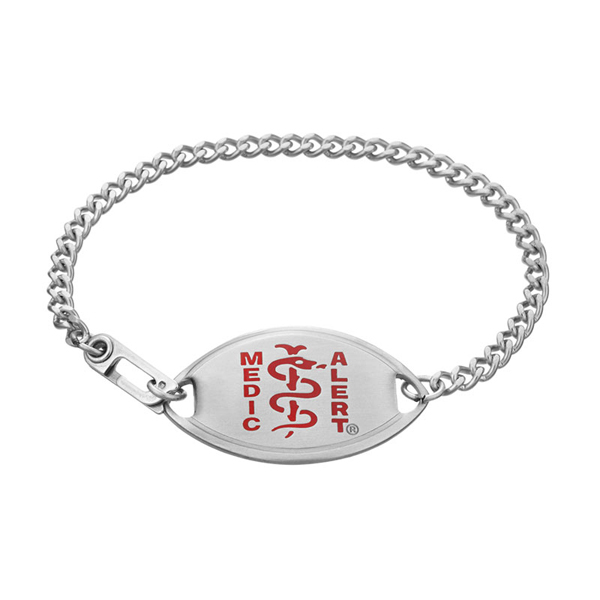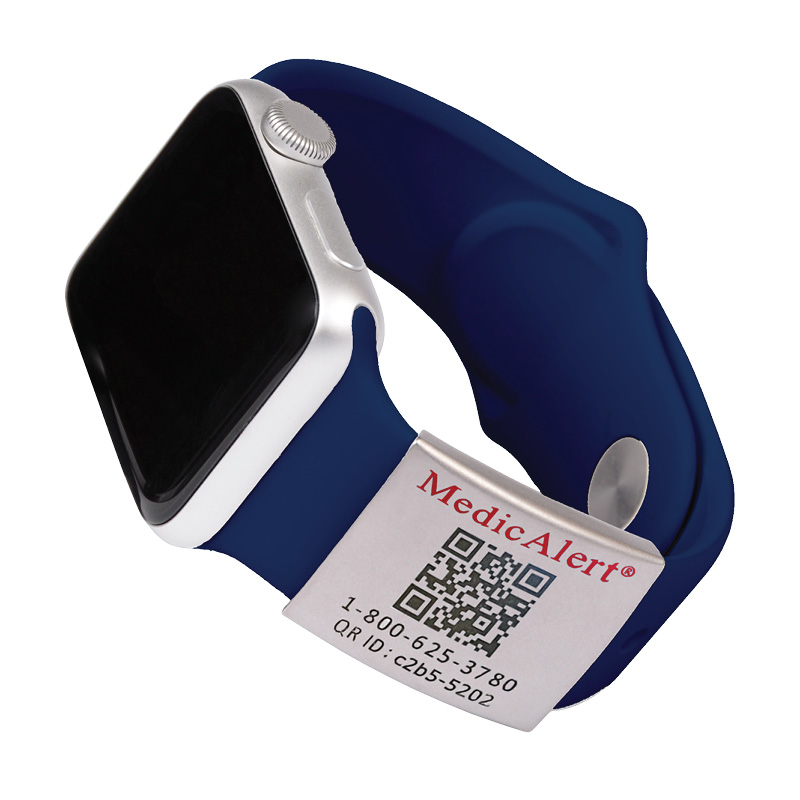
Medical IDs for Aphasia
More than one million people in the U.S. are currently living with aphasia. Read below to learn how a medical ID can protect you and your loved ones.
The confidence to live with allergies
It is estimated that 5% to 10% of people living in the U.S. may have communication disorders such as aphasia, yet nearly 85% of Americans have never heard of the condition. Because aphasia is not easily recognized and people living with the condition have great difficulty communicating wants and needs, wearing a medical ID is critical to their safety and well-being.
Wearing a MedicAlert medical ID for aphasia can be your voice in these situations.
How MedicAlert protects those living with aphasia
One thing you shouldn’t need to worry about is what could happen if there’s an emergency. MedicAlert’s protection plans offer benefits that extend beyond the ID, providing safety and peace of mind for people living with aphasia, their families and caregivers.

24/7 Emergency Response
Our team provides first responders the information they need to provide fast, accurate care.

Digital Health Profile
All your vital information, all in one place for you and your caregiver.

Emergency Contact Notification
In an emergency, we connect families so that no one is alone in a crisis.

Patient Instructions
Share the information that’s important to your care, such as use of rescue medications or contraindication for tests like MRIs.
Pair a medical ID with the protection plan that’s right for you.
What exactly is aphasia?
More than one million people in the U.S. are currently living with aphasia, and nearly 180,000 Americans are diagnosed with it each year. Aphasia results from conditions ranging from traumatic brain injuries to stroke. These conditions can cause damage to the left side of the brain, which is responsible for language and speech. Because brain function is impacted, people living with aphasia have great difficulty with understanding, processing, and cognitive reasoning. Aphasia can also affect how a person speaks, reads, and writes.
Communication plays a vital role in every aspect of life, so aphasia can greatly affect a person’s quality of life. Aphasia can affect:
- Day-to-day functioning.
- Performance at work and school.
- Relationships.
A MedicAlert ID for aphasia can help—especially in a medical emergency. A MedicAlert ID can be your voice if you are in an accident or have another medical emergency. Add a protection plan and you will have an additional layer of protection in case of an emergency, and even in day-to-day situations such as routine doctor or dental visits.
What causes aphasia?
The most common cause of aphasia is stroke. It is estimated that 25% to 40% of people who survive a stroke will develop aphasia. Other causes of aphasia include severe injury to the head resulting in brain damage, brain tumors, infections, and the most common form of dementia—Alzheimer’s disease. In cases of dementia, aphasia develops gradually. This is called primary progressive aphasia.
In some cases, a person can experience temporary episodes of aphasia caused by seizures, migraines, and transient ischemic attack (TIA). Often called a mini-stroke, TIA is a temporary blockage of blood flow to the brain that can be caused by everything from smoking and alcoholism to high blood pressure, obesity, and diabetes.
Engraving your MedicAlert ID for aphasia
MedicAlert offers free custom engraving on all our aphasia bracelets and medical ID products. Engravings on medical IDs for aphasia should include any critical medical information that can protect and save lives in an accident or medical emergency.
The best things to engrave on a medical bracelet for aphasia include:
- Aphasia, other conditions
- Medications
- Designated physician and emergency contact information
- Any additional medical information that needs to be communicated to first responders and others

Sample engraving. Consult our team if you need help engraving your medical ID for aphasia.
Find your medical ID.
What are the symptoms and complications of aphasia?
Aphasia is often a symptom of another condition such as a stroke, brain injury, or brain tumor. A person living with aphasia may:
- Experience difficulty finding the right words
- Not process or understand what they read
- Not understand conversations of others
- Speak in incomplete or short sentences
- Speak in sentences that don’t make sense
- Speak odd or indistinguishable words
- Substitute one sound for another sound, use the wrong word, or transpose sounds within a long word (paraphasia)
- Substitute one word for another or one sound for another
- Write sentences that don’t make sense
Depending on the cause of aphasia, symptoms can range from mild to severe. Symptoms can affect a person’s job performance, relationships, performance in school, and day-to-day interactions and living.
Aphasia symptoms may not be easily recognized as a condition. This is why it is important for you to wear a MedicAlert ID for aphasia. If you are in an emergency medical situation, a MedicAlert ID can protect you by letting first responders know that you are living with aphasia, so communication can be challenging. A MedicAlert ID can communicate your condition for you as well as emergency contact information and any medications you may be taking. A MedicAlert ID can help ensure fast and appropriate treatment in just about every medical situation.
Wearing a MedicAlert ID can also help you with day-to-day living by letting others know that you are living with aphasia. When others understand that you are living with aphasia, they will often respond in a helpful, caring, and patient manner to help you obtain the things you want or need.
How do you diagnose aphasia?
Healthcare providers have a number of tools to help diagnose aphasia. Your doctor will perform a physical exam and ask questions about your medical history. Your doctor may also order cognitive, memory, diagnostic, imaging, sensory, and nerve function tests.
- Cognitive and memory tests help rule out other issues with thinking ability or memory.
- Diagnostic and imaging tests look for lesions and other signs of damage to the brain.
- Sensory and nerve function tests help rule out hearing disorders or nerve damage as the cause of similar symptoms to aphasia.
Speech language specialists, neurologists, and other specialists administer tests for aphasia. Cleveland Clinic lists the following possible tests for the disorder:
- Blood tests to look for everything from immune system problems to toxins and poisons, especially certain metals like copper
- Computerized tomography scan (CT scan)
- Electroencephalogram (EEG)
- Electromyogram (EMG)
- Evoked potentials test
- Genetic testing
- Magnetic resonance imaging (MRI)
- Positron emission tomography scan (PET scan)
- Spinal tap (lumbar puncture)
- X-rays
How do you treat, manage, and live with aphasia?
While there is no cure for aphasia, many treatment options are available, and they are often tailored to the individual. However, the mainstays of aphasia treatment include treating the underlying condition and speech-language therapy. Group and family therapy are other options, as well as nonverbal communication therapies that utilize pictures and computers.
A person living with aphasia will have difficulty with all forms of communication including reasoning, talking, reading, and writing. This can have an impact on every facet of life including work, school, relationships, and routine activities. Aphasia can also make it difficult to communicate in an emergency. Let MedicAlert be your voice.
A MedicAlert ID and protection plan for aphasia can be there for you when you are unable to relay vital information about your condition to emergency responders, ER doctors, and hospital staff. Our Advantage Plus protection plan for aphasia has you covered in emergency situations, during your regular doctor visits, and even day-to-day living.
Living with aphasia? Get peace of mind.
Pair your ID with a MedicAlert Membership.
If you are living with aphasia, a MedicAlert medical ID can be your voice if you are unable to communicate in an emergency or other medical situations. A MedicAlert medical ID can provide vital information about your condition to first responders and ER doctors when you are unable to.
Knowing that you are living with aphasia allows doctors to quickly identify the best ways to communicate with you, ensuring fast, accurate, and safe treatment. Add a MedicAlert protection plan, and you will have an additional layer of protection in medical emergencies and other health-related situations.

We'll be your voice. If you can’t speak for yourself due to a medical emergency, your ID will speak for you – informing others about your aphasia and any medications you’re taking.
We provide 24/7 emergency protection. Our team will relay your critical medical information to first responders in an emergency, no matter where or when it happens.
We keep you connected. You or a loved one should never have to be alone in an emergency. That’s why MedicAlert will reach out to your emergency contacts when needed if you are unable to do so.
We enable you to live with confidence. MedicAlert will be there for you every step of the way. You’ll have the confidence and freedom to live your life with aphasia, knowing we’ve got you covered.



